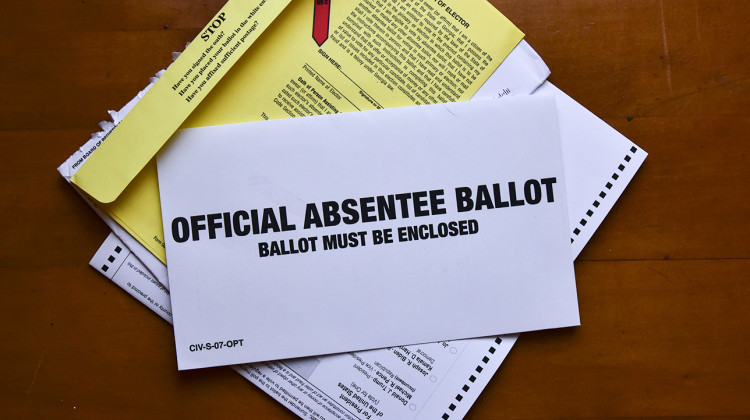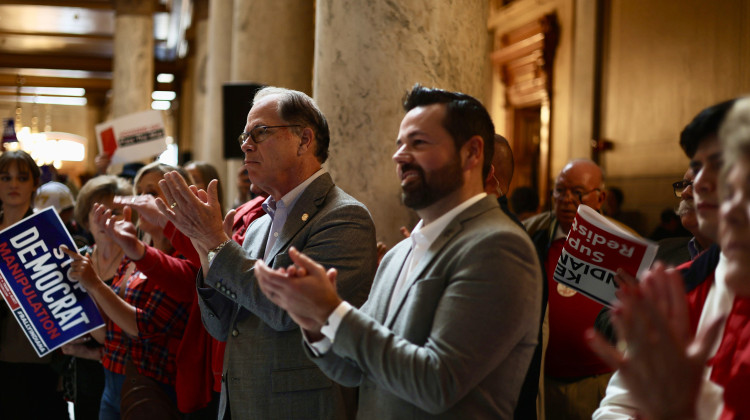
Millions of Americans perceive politics as a significant source of stress. Some experts called it sociopolitical stress.
Justin Hicks / Indiana Public BroadcastingElection Day is fast approaching and a lot of people are at the end of their rope. Research shows an estimated 94 million Americans perceive politics as a significant source of stress. Some even lose sleep over politics and others struggle with suicidal thoughts.
“The constant barrage of negativity and fear driven narratives was leaving me irritable, exhausted and anxious. Politics was killing my soul,” Rachel, an Indianapolis resident in her fifties, told Side Effects. “So, I decided for my mental health to listen to more music and humorous podcasts like wait, wait, don't tell me on NPR.”
This time’s Checkup question is: What should you do to take care of your mental health during elections? That’s The Checkup’s question for today.
Side Effects Public Media’s Community Engagement Specialist Lizzy McGrevy spoke with Health Reporter Elizabeth Gabriel to find out.
This transcript has been edited for length, style and clarity.
Lizzy McGrevy: There have been a lot of twists and turns during this election cycle. A new Democratic presidential candidate entered the race last minute, and there were two assassination attempts on the Republican nominee. Not to mention, many people on both sides of the aisle are concerned about the future of health care and other issues.
I’ve been speaking to a few people and they are capital S stressed about this election.
Elizabeth Gabriel: Yeah, I’ve heard a lot of people also feel similarly. This category of mental health is known as sociopolitical stress. It’s become prevalent in people who are more politically active compared to people who aren’t engaged in politics.
McGrevy: Okay, so this actually has a name? Tell me more, who is the most impacted by sociopolitical stress and how?
Gabriel: I spoke with Sara Suzuki, a researcher with the Center for Information And Research on Civic Learning and Engagement. In 2020, she tracked sociopolitical stress before, during and after the election. The people who experience it the most are those who are arguably impacted the most by politics.
“LGBTQ plus youth, as well as youth who are transgender, women also tended to have higher socio political stress. And in that specific research, we were starting to find a pattern of youth of color having those higher levels too,” Suzuki says.
McGrevy: What are some of the signs or symptoms that someone is experiencing sociopolitical stress?
Gabriel: There are many factors. Some of that looks like changes in sleep or appetite. Ruminating or looping thoughts that play over and over in your head are also an indication.
Therapist Laurel Roberts-Meese says sociopolitical stress can exacerbate other mental health problems someone is already struggling with. Research shows that a little bit of stress and anxiety is good for the body. But too much can be bad.
“We're going to start seeing more breakdown of tissue. We're going to see more neural networks that are not serving the person. We're going to see more trauma memories getting triggered, and chronic health conditions that are pre existing are going to get worse,” Roberts-Meese says.
That’s why we have to be careful of how much we’re taking on, which can look different for each person.
McGrevy: You know, Elizabeth, I thought I was eating a lot of Reese's cups because it was Halloween season. Turns out it might just be my sociopolitical stress. So, I will be sure to talk to my therapist about that. But I also can’t help but think – not everyone has the luxury of just tuning out sometimes. For some people the political discourse may be directly threatening their identity, their core beliefs or ability to stay in the country. So, how do we juggle being engaged but also staying informed?
Gabriel: Therapists say checking your news sources is really important, and signing up for newsletters could be a way to stay informed without being overwhelmed. But they also talk about limiting the amount of time you spend on social media to make sure you aren’t overexposing yourself to frustrating or disturbing content. That can lead to vicarious traumatization.
“Vicarious traumatization and continually exposing yourself to upsetting information is not the same thing as activism,” she says. “You can be an activist and not just be constantly doom scrolling. In fact, you're going to have more capacity to be an activist if you're not constantly stressing yourself out.”
On election night, therapists say it’s okay not to watch the results come in. We all know this is going to be the main topic of conversation for the next few weeks, if not longer. It’s okay to do a puzzle or something more soothing to maintain your stress levels.
Scheduling time to write out your worries about the election for about 20 or so minutes can be helpful too. And putting your phone in another room before you head to bed so you don’t end up doom scrolling.
McGrevy: Sounds like it might be time to dust off the trusty old alarm clock and maybe some of those puzzles and board games for election night.
Gabriel: Yeah, that sounds very fun.
McGrevy: You're welcome over anytime to not stress about the election. Elizabeth, thank you for the great information.
Elections are Nov. 5. Early in-person voting will start soon or has started in most states. Check with your local voting and election agencies for more information.
The Checkup by Side Effects Public Media is a regular audio segment on WFYI's daily podcast, WFYI News Now.
Contact WFYI’s health reporter Elizabeth Gabriel at egabriel@wfyi.org.
Side Effects Public Media is a health reporting collaboration based at WFYI in Indianapolis. We partner with NPR stations across the Midwest and surrounding areas — including KBIA and KCUR in Missouri, Iowa Public Radio, Ideastream in Ohio and WFPL in Kentucky.
 DONATE
DONATE






 Support WFYI. We can't do it without you.
Support WFYI. We can't do it without you.